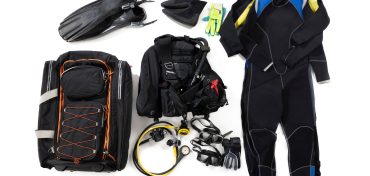When The Ocean Calls
For many divers, traveling internationally with your scuba gear offers comfort, reliability, and familiarity. But flying with equipment isn’t as straightforward as packing a swimsuit. Therefore, read about what you need to know before heading overseas with your dive gear. Prepare your travel abroad with SCUBA Diving Equipment.
Traveling Abroad with SCUBA Diving Equipment: What You Can Pack
Most airlines allow standard scuba gear in checked baggage, including:
- Mask, fins, and snorkel
- Regulator
- Buoyancy Control Device (BCD)
- Wetsuit or drysuit
- Dive computer
- Surface marker buoy (SMB)
- A large mesh bag — handy for transporting wet gear and avoiding carrying your entire main bag on dive boats
Make Sure Items Pass Security and Customs
Keep in mind, some airlines prohibit dive lights and dive knifes. Ensure these items are allowed on the airline for your travel abroad SCUBA diving.
- Dive lights (carry-on only, with batteries removed)
- Dive knife (checked baggage only, depending on the carrier and country . Be prepared to have your checked baggage opened by security. Don’t place a lock on your case while flying.)
What You Cannot Pack
- Pressurized tanks: Even if emptied, residual pressure can make them unsafe for flights.
- Lead weights: Technically allowed, but too heavy to be practical.
- Lithium-ion batteries: Must be in your carry-on, disconnected, in a protective case.
- Tanks and weights are typically not permitted due to safety regulations and the excessive weight they can carry. Renting these at your destination is often more practical. Always verify your airline’s dangerous goods policy before traveling.
Remember to check local laws for the countries you are traveling to. For instance, the Netherlands prohibits spearfishing, and Ireland requires a license when spearfishing. Furthermore, China and Hong Kong have a ban on bringing in spears. Finally, Japan, South Korea (and likely North Korea), Germany, the UK, and Spain prohibit diving knives. While we list key countries, research each place you visit and ensure you are allowed to bring high-risk equipment before you waste your time and money.
How to Pack Your Scuba Gear
- Ensure all gear is dry before packing to avoid paying extra for water weight.
- Use a padded scuba gear bag or a hard-shell suitcase for protection.
- Pack your regulator, dive computer, and mask in your carry-on to prevent damage.
- If checking your mask, put it in a hard case or inside your fin boot to protect it.
- Heavier items, such as BCDs and fins, should be placed at the bottom of the bag, wrapped in your wetsuit.
- Use TSA-approved locks and consider placing an Apple AirTag or similar tracker inside your luggage for peace of mind.
Rent vs. Bring: Know Your Destination
In many regions, renting gear is easier and more cost-effective:
- Southeast Asia (Thailand, Indonesia, Philippines): Affordable rental gear is standard.
- Caribbean cruises: Cruise lines such as Carnival and Royal Caribbean often offer dive packages that include equipment.
In remote areas, such as parts of the Pacific or Africa, bringing your gear may be essential due to limited or poorly maintained rental options. Therefore, consider your mode of travel and research ahead of time. Traveling abroad with SCUBA diving equipment is necessary at times, but not always possible.
Pro Packing Tips
- Consider lightweight travel fins or compact BCDs for frequent trips.
- Bring your PADI certification card or use the PADI app.
- Consider travel insurance that covers dive gear.
- Regular divers should get DAN insurance — it’s standard for dive professionals.
- Label your gear to avoid confusion on group dives.
- Confirm equipment availability when booking cruises or liveaboards.
Preparation is Key
With the proper preparation, bringing your scuba gear abroad can significantly enhance your diving experience. Whether you’re diving wrecks in the Red Sea or exploring reefs in Southeast Asia, proper planning ensures your adventure stays underwater — not stuck at baggage claim. Furthermore, if you are interested in diving with a group, contact By the Shore SCUBA Instruction to find out if we have a group charter. From time to time we travel in groups and help divers save on international dives. Located in Raleigh, NC, our PADI Master Kevin Alexander provides experience, adventure, and travels abroad with SCUBA diving equpiment.
Sources
- https://forums.deeperblue.com/threads/spearfishing-belgium-and-netherlands-2020.116412/
- https://bpsknives.com/knife-laws-around-the-world-what-you-need-to-know/#:~:text=Certain%20types%20of%20knives%20are,%C2%A7%2042%20German%20Weapons%20Act).
- https://www.diverightinscuba.com/blog/traveling-with-scuba-gear-and-the-tsa
- https://www.royalcaribbean.com/faq/questions/what-is-included-for-the-padi-diver-course?&country=USA
- https://www.carnival.com/shore-excursions/cozumel/beginner-s-scuba-diving-304004

